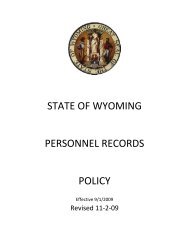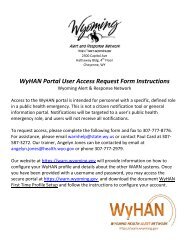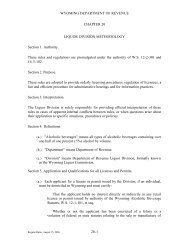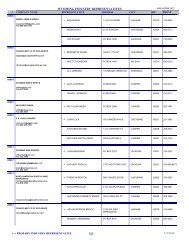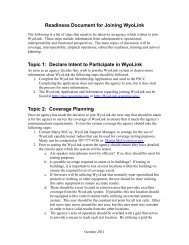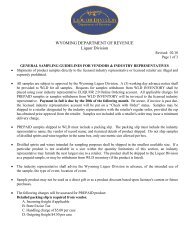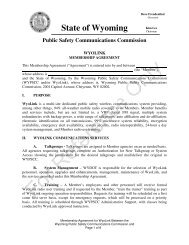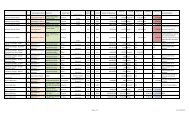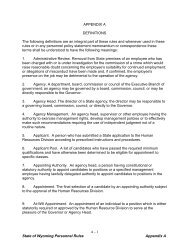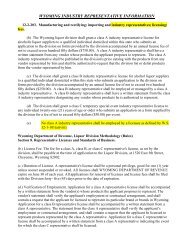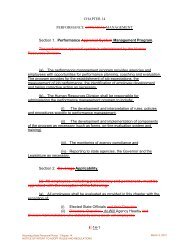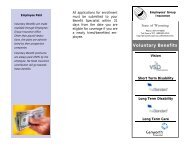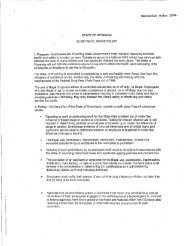Grievances and Appeals for Permanent Employees - State of Wyoming
Grievances and Appeals for Permanent Employees - State of Wyoming
Grievances and Appeals for Permanent Employees - State of Wyoming
You also want an ePaper? Increase the reach of your titles
YUMPU automatically turns print PDFs into web optimized ePapers that Google loves.
CHAPTER 12<br />
GRIEVANCES AND APPEALS<br />
FOR PERMANENT EMPLOYEES<br />
Section 1. <strong>State</strong>ment <strong>of</strong> Policy.<br />
It is the policy <strong>of</strong> the <strong>State</strong> <strong>of</strong> <strong>Wyoming</strong> to resolve employee grievances<br />
<strong>and</strong> appeals in a fair <strong>and</strong> timely manner. <strong>Employees</strong> may voluntarily participate<br />
in the mediation program which assists disputing parties in reaching a mutually<br />
acceptable resolution to issues <strong>and</strong> concerns raised by the parties. <strong>Employees</strong><br />
who voluntarily choose to participate in the mediation program shall not <strong>for</strong>feit<br />
their right to present a grievance in accordance with this chapter. <strong>Employees</strong><br />
shall have the right to present a grievance or appeal, pursuant to the provisions<br />
<strong>of</strong> this chapter, without coercion, restraint, discrimination or reprisal. No <strong>State</strong><br />
agency covered by these Personnel Rules shall adopt or implement a separate<br />
or different employee grievance procedure. In implementing <strong>and</strong> facilitating this<br />
policy, all state agencies shall comply with these rules <strong>and</strong> all other applicable<br />
law.<br />
Section 2. General Provisions.<br />
(a) Time Periods.<br />
(i) In computing any period <strong>of</strong> time prescribed or allowed by this<br />
chapter, the day <strong>of</strong> the act, event or default from which the designated period <strong>of</strong><br />
time begins shall not be included. The last day <strong>of</strong> the period so computed shall<br />
be included, unless that day is a Saturday, Sunday or legal holiday. When the<br />
period <strong>of</strong> time prescribed or allowed is ten (10) days, intermediate Saturdays,<br />
Sundays or legal holidays shall be excluded from the computation.<br />
(ii) When these rules or a notice given there under is required or<br />
allowed to be done at or within a specified time, the Human Resources<br />
Administrator may, upon written application, <strong>for</strong> good cause shown, at his<br />
discretion extend or enlarge the time period, provided that any such written<br />
request is received be<strong>for</strong>e the expiration <strong>of</strong> the period originally prescribed.<br />
(iii) Any procedural step allowed by these rules may be waived by<br />
mutual written agreement between the parties involved. A copy <strong>of</strong> this<br />
agreement shall be <strong>for</strong>warded to the Human Resources Administrator or the<br />
Presiding Officer, as applicable.<br />
(b) Designation <strong>of</strong> Parties. As used in this chapter, the word employee<br />
shall refer to permanent employees only.<br />
12-1<br />
<strong>State</strong> <strong>of</strong> <strong>Wyoming</strong> Personnel Rules - Effective 6-1-10 Chapter 12
(c) Representation. In all proceedings provided under this chapter an<br />
employee who is a party to the proceedings shall have the right to appear<br />
personally <strong>and</strong> may be accompanied by his/her chosen representative.<br />
(d) Release Time. The employee who is a party to the proceedings, any<br />
employees who are witnesses subpoenaed by the Presiding Officer <strong>for</strong> a party or<br />
are requested to appear by a Grievance Committee, <strong>and</strong> employee Grievance<br />
Committee members shall be granted administrative leave while participating in<br />
any proceedings provided under this chapter. In accordance with Section 5 (a)<br />
<strong>and</strong> Section 5 (c), an employee who has filed a grievance shall be entitled to a<br />
maximum <strong>of</strong> eight (8) hours <strong>of</strong> administrative leave to prepare <strong>for</strong> presentation <strong>of</strong><br />
the grievance. Prior notice shall be given to the employee's supervisor.<br />
(e) Grievance Committee: Membership <strong>and</strong> Compensation. Grievance<br />
Committee members shall be individuals who have consented to serve as such<br />
<strong>and</strong> who are not parties to the dispute, nor employees from the same agency as<br />
either party to the dispute, nor advocates <strong>of</strong> either party to the dispute.<br />
Grievance Committee members shall not have any ex parte communication with<br />
the parties to the dispute during the grievance process. Non-employee<br />
Grievance Committee members shall serve without compensation but shall be<br />
reimbursed <strong>for</strong> expenses in the same manner <strong>and</strong> at the same rate as<br />
employees.<br />
(f) Personnel Appeal Hearing: Presiding Officer <strong>and</strong> Compensation. As<br />
used in these Rules, Presiding Officer shall mean the person agreed upon by the<br />
employee <strong>and</strong> the agency to preside over the personnel appeal hearing, or, if the<br />
employee <strong>and</strong> the agency are unable to agree upon such a person, Presiding<br />
Officer shall mean the hearing <strong>of</strong>ficer assigned from the Office <strong>of</strong> Administrative<br />
Hearings. The Presiding Officer shall be an individual who has consented to<br />
serve as such <strong>and</strong> who is fair, impartial <strong>and</strong> disinterested <strong>and</strong> who is not a party<br />
to the dispute, is not from the same agency as either party to the dispute <strong>and</strong> is<br />
not an advocate <strong>of</strong> either party to the dispute. Presiding Officers shall be<br />
compensated <strong>and</strong> have their expenses reimbursed as provided in W.S. 9-2-<br />
1019(a).<br />
(i) The Presiding Officer shall have original jurisdiction in all<br />
hearings which involve the dismissal or the involuntary separation due to a<br />
reduction in <strong>for</strong>ce <strong>of</strong> a permanent employee <strong>and</strong> jurisdiction in disciplinary<br />
suspension appeals, pursuant to Chapter 12, Section 6 <strong>of</strong> these Rules.<br />
(g) Grievance Committee Decisions. Decisions <strong>of</strong> a Grievance<br />
Committee shall require a majority vote <strong>of</strong> the body. No hearing shall be<br />
conducted without the presence <strong>of</strong> all committee members, unless stipulated to<br />
by the parties. The hearing may be conducted by telephone or other electronic<br />
media.<br />
12-2<br />
<strong>State</strong> <strong>of</strong> <strong>Wyoming</strong> Personnel Rules - Effective 6-1-10 Chapter 12
(h) Custody <strong>of</strong> Records. The <strong>State</strong> Human Resources Administrator shall<br />
be the <strong>of</strong>ficial custodian <strong>of</strong> all papers <strong>and</strong> records pertaining to the provisions <strong>of</strong><br />
this chapter. Such material shall be considered confidential, but the parties<br />
<strong>and</strong>/or their representative shall have access to any <strong>and</strong> all materials associated<br />
with the employee, the grievance or the appeal except as prohibited by statute<br />
<strong>and</strong> rules adopted in accordance with the <strong>Wyoming</strong> Administrative Procedure<br />
Act.<br />
(i) Confidential Proceedings. Grievance or appeal proceedings may be<br />
conducted in executive session not open to the public, unless the employee<br />
requests a public hearing pursuant to W.S. 6-4-405 et. seq..<br />
Section 3. Definition <strong>of</strong> Grievance.<br />
A grievance is a dispute, excluding a dismissal or an involuntary<br />
separation due to a reduction in <strong>for</strong>ce, between an employee <strong>and</strong> management<br />
<strong>of</strong> the employee's agency which involves the interpretation or application <strong>of</strong><br />
policies, rules, regulations, <strong>and</strong>/or statutes which have been adopted by an<br />
agency, Governor's Executive Order, or the <strong>State</strong> Legislature to cover personnel<br />
practices <strong>and</strong>/or working conditions.<br />
Section 4. Compliance with Procedure.<br />
If an employee does not properly comply with the procedural steps<br />
required by this chapter, the employee shall have <strong>for</strong>feited rights granted by<br />
these provisions <strong>for</strong> the grievance. If the agency does not properly comply with<br />
the procedural steps, the employee may proceed to the next step in the<br />
grievance procedure within ten (10) days <strong>of</strong> the agency's noncompliance with the<br />
procedural steps.<br />
Section 5. Grievance Procedure Steps.<br />
(a) Within ten (10) days <strong>of</strong> the event giving rise to the grievance or <strong>of</strong> the<br />
employee having knowledge <strong>of</strong> the event, the employee may present the<br />
grievance in writing to the management employee at the lowest level giving rise<br />
to the dispute. When the grievance involves the allegation <strong>of</strong> sexual harassment,<br />
the employee may present the grievance to the agency head in accordance with<br />
Section 5 (c) <strong>of</strong> this chapter. When the management employee is the agency<br />
head, the grievance shall be presented to the agency head in accordance with<br />
Section 5 (c) <strong>of</strong> this chapter. The grievance shall specify the time, parties<br />
involved, a brief statement <strong>of</strong> the grievance <strong>and</strong> relief sought.<br />
(b) Within ten (10) days <strong>of</strong> receiving the written grievance, the appropriate<br />
management employee shall hold a conference with the employee to resolve the<br />
12-3<br />
<strong>State</strong> <strong>of</strong> <strong>Wyoming</strong> Personnel Rules - Effective 6-1-10 Chapter 12
dispute <strong>and</strong> render a decision in writing to the employee within ten (10) days after<br />
the conference. The written decision shall state the next step in the appeal<br />
process <strong>for</strong> the employee <strong>and</strong> the time limit <strong>for</strong> that step.<br />
(c) If the decision <strong>of</strong> the management employee is unsatisfactory to the<br />
employee, the employee may, within ten (10) days <strong>of</strong> the date <strong>of</strong> the decision,<br />
submit the grievance in writing to the agency head. The grievance shall specify<br />
the time, parties involved, a brief statement <strong>of</strong> the grievance <strong>and</strong> relief sought.<br />
(d) Within ten (10) days <strong>of</strong> receiving the written grievance, the agency<br />
head or his/her designee <strong>and</strong> the appropriate management employee shall hold<br />
a conference with the employee to resolve the dispute <strong>and</strong> render a decision, in<br />
writing, to the employee within ten (10) days after the conference. A decision by<br />
the agency head or the designee shall be the final step in the grievance<br />
procedure unless the grievance involves a dispute in accordance with Section 5<br />
(e) <strong>of</strong> this chapter.<br />
(e) If the decision <strong>of</strong> the agency head or the designee is unsatisfactory to<br />
the employee <strong>and</strong> if the grievance involves a written reprim<strong>and</strong>, a disciplinary<br />
suspension or an involuntary reappointment due to unsatisfactory work<br />
per<strong>for</strong>mance, the employee may, within ten (10) days <strong>of</strong> the date <strong>of</strong> the decision,<br />
request the Human Resources Administrator to establish a Grievance Committee<br />
to hear the matter. Other matters may be considered by a Grievance Committee<br />
at the discretion <strong>of</strong> the <strong>State</strong> Human Resources Administrator. All requests shall<br />
be submitted, in writing, to the <strong>State</strong> Human Resources Administrator <strong>and</strong> shall<br />
include the nomination <strong>of</strong> an individual to serve as a grievance committee<br />
member. A copy <strong>of</strong> this request to establish a grievance committee shall be<br />
provided to the employee’s agency head by the employee.<br />
(f) Within ten (10) days <strong>of</strong> the date <strong>of</strong> a request <strong>for</strong> the establishment <strong>of</strong> a<br />
Grievance Committee, the <strong>State</strong> Human Resources Administrator or his/her<br />
designee shall notify the head <strong>of</strong> the agency with which the employee has the<br />
dispute; <strong>and</strong> request the nomination <strong>of</strong> a Grievance Committee member. The<br />
agency head shall notify the <strong>State</strong> Human Resources Administrator or his/her<br />
designee <strong>of</strong> the nomination within ten (10) days.<br />
(g) Within ten (10) days <strong>of</strong> receipt <strong>of</strong> the agency head nomination, the<br />
<strong>State</strong> Human Resources Administrator shall notify the two (2) nominees that they<br />
are to serve as Grievance Committee members, <strong>and</strong> that they shall within fifteen<br />
(15) days <strong>of</strong> receipt <strong>of</strong> such notice <strong>for</strong>m the committee by selecting a third<br />
member. A chairperson <strong>and</strong> secretary shall be selected from among committee<br />
members.<br />
(h) Grievance Committee Purpose <strong>and</strong> Authority.<br />
12-4<br />
<strong>State</strong> <strong>of</strong> <strong>Wyoming</strong> Personnel Rules - Effective 6-1-10 Chapter 12
(i) The purpose <strong>of</strong> the Grievance Committee is to resolve a dispute<br />
which falls within Section 5 (e) <strong>of</strong> this chapter.<br />
(ii) The Grievance Committee has the authority to affirm, modify or<br />
reverse any action(s) so long as the decisions <strong>and</strong> recommendations are not in<br />
conflict with Personnel Rules, <strong>State</strong> Statutes, or agency rules <strong>and</strong> regulations.<br />
Decisions <strong>of</strong> the Committee are final unless the grievance is appealable in<br />
accordance with Section 6 <strong>of</strong> this chapter.<br />
(i) Grievance Hearings.<br />
(i) Within <strong>for</strong>ty-five (45) days <strong>of</strong> the <strong>for</strong>mation <strong>of</strong> a Grievance<br />
Committee, the Committee shall schedule <strong>and</strong> hold a hearing or render a<br />
decision without a hearing, based solely on the written record.<br />
(A) The written record shall constitute <strong>and</strong> is limited to the<br />
documentation provided by the parties in Chapter 12 Section 5(a)(b)(c) <strong>and</strong> (d).<br />
(B) If the issues raised by either or both parties are such<br />
that further proceedings are unnecessary, the Committee shall submit a written<br />
decision to the <strong>State</strong> Human Resources Administrator who shall <strong>for</strong>ward copies<br />
to both parties.<br />
(C) If the issues raised by either or both parties are such that<br />
further proceedings are necessary, the Committee shall initiate a hearing. The<br />
hearing shall be concluded within ten (10) days <strong>of</strong> initiation, provided that the<br />
hearing may be extended with the agreement <strong>of</strong> both parties <strong>and</strong> a majority <strong>of</strong><br />
the Grievance Committee. The Grievance Committee shall select a location <strong>for</strong><br />
the hearing which is most convenient <strong>for</strong> the parties <strong>and</strong> their interests.<br />
(ii) General Provisions <strong>for</strong> a Grievance Hearing.<br />
(A) The chairperson shall ensure a fair, orderly, <strong>and</strong><br />
expeditious hearing. Decisions to accept or reject evidence, upon objection by<br />
another committee member, shall require a majority vote <strong>of</strong> the Grievance<br />
Committee. Upon initiation <strong>of</strong> the hearing, the chairperson shall read the<br />
"Chairperson's Opening <strong>State</strong>ment" <strong>and</strong> answer any questions regarding<br />
procedure prior to proceeding with the hearing.<br />
(B) The hearing shall be confined to those issues related to<br />
the subject matter presented in the original written grievance <strong>and</strong> issues<br />
reasonably necessitated by intervening development, <strong>and</strong> shall not be allowed to<br />
develop into a general inquiry into the policies <strong>and</strong> operation <strong>of</strong> an agency.<br />
(C) The Grievance Committee may issue requests to<br />
12-5<br />
<strong>State</strong> <strong>of</strong> <strong>Wyoming</strong> Personnel Rules - Effective 6-1-10 Chapter 12
produce evidence.<br />
(D) If a party does not appear at the hearing, the Grievance<br />
Committee may base its decision on a consideration <strong>of</strong> the documents provided<br />
<strong>and</strong> on the presentation <strong>of</strong> the case by the party present.<br />
(E) The Grievance Committee may allow a party at its<br />
request to examine items which the other party intends to submit as evidence in<br />
the hearing. Such examination shall be completed at least three (3) days prior to<br />
the hearing unless the parties stipulate to a different time.<br />
(iii) The hearing shall be opened with an announcement including<br />
identification <strong>of</strong> the parties <strong>and</strong> their representatives, identification <strong>of</strong> the<br />
Grievance Committee members <strong>and</strong> the date. No record shall be made <strong>of</strong> this<br />
hearing. The chairperson shall read aloud the following statement which shall<br />
constitute the guidelines under which the hearing is to be conducted. "This<br />
hearing will be conducted as in<strong>for</strong>mally as is compatible with an orderly process.<br />
As presiding <strong>of</strong>ficer <strong>for</strong> this hearing, I will take whatever action is necessary to<br />
ensure a fair, orderly, <strong>and</strong> expeditious hearing. This hearing will not be bound by<br />
rules <strong>of</strong> evidence. In the event that another member <strong>of</strong> this Grievance<br />
Committee objects to my decision to accept or reject evidence, the majority vote<br />
<strong>of</strong> the Grievance Committee shall govern. Documents pertinent to this dispute<br />
have been provided by the <strong>State</strong> Human Resources Administrator to this<br />
Grievance Committee. The employee or the employee's representative may<br />
present an opening statement. The agency may then present an opening<br />
statement. The employee will call witnesses who will give the committee any<br />
in<strong>for</strong>mation they have pertinent to the grievance. Upon completion <strong>of</strong> the<br />
employee's presentation, the agency may present its case. Each party will be<br />
given the opportunity, at the appropriate times, to ask questions <strong>of</strong> the witnesses.<br />
Any member <strong>of</strong> the Grievance Committee may direct questions to any party or<br />
witness at any time during the proceedings. Be<strong>for</strong>e the conclusion <strong>of</strong> the<br />
hearing, each party may present a brief summary or closing statement. Only<br />
evidence relevant to the grievance will be allowed, <strong>and</strong> evidence which is<br />
repetitive will be excluded. Witnesses are asked not to discuss this case with<br />
anyone, other than the party <strong>for</strong> whom they are appearing until after they are<br />
excused. Witnesses are to remain available until they are excused by the<br />
Grievance Committee with the consent <strong>of</strong> both parties. Witnesses, except <strong>for</strong> the<br />
parties, shall not remain in the hearing room except when called. The Grievance<br />
Committee will report its written findings <strong>and</strong> decision, with all documents<br />
presented, to the <strong>State</strong> Human Resources Administrator within fifteen (15) days<br />
<strong>of</strong> the conclusion <strong>of</strong> the hearing. Are there any questions by either party?"<br />
(iv) Within fifteen (15) days following conclusion <strong>of</strong> a hearing, the<br />
Grievance Committee shall prepare a written summary statement <strong>of</strong> the evidence<br />
<strong>and</strong> its findings, decision <strong>and</strong> recommendations. Any committee members voting<br />
12-6<br />
<strong>State</strong> <strong>of</strong> <strong>Wyoming</strong> Personnel Rules - Effective 6-1-10 Chapter 12
in the minority may prepare a minority statement which shall be a part <strong>of</strong> the<br />
material submitted. The chairperson shall ensure that all evidence, findings,<br />
decisions <strong>and</strong> minority statements <strong>and</strong> recommendations are <strong>for</strong>warded to the<br />
<strong>State</strong> Human Resources Administrator, agency head, employee, <strong>and</strong> the<br />
employee's representative, if any.<br />
Section 6. Disciplinary Suspension or Involuntary Reappointment<br />
Due To Unsatisfactory Work Per<strong>for</strong>mance Appeal.<br />
If the disciplinary action being grieved by the employee is a disciplinary<br />
suspension or an involuntary reappointment due to unsatisfactory work<br />
per<strong>for</strong>mance, either party may, within twenty (20) days <strong>of</strong> the date <strong>of</strong> the decision<br />
<strong>of</strong> the Grievance Committee, file a petition <strong>for</strong> a personnel appeal hearing with<br />
the <strong>State</strong> Human Resources Administrator. Such appeal hearing shall be<br />
conducted as a new hearing, with opportunity <strong>for</strong> the presentation <strong>of</strong> evidence, as<br />
provided in Section 7 <strong>of</strong> this chapter. If neither party files a petition <strong>for</strong> a<br />
personnel appeal hearing within the time frame prescribed above, the Grievance<br />
Committee determination shall be final.<br />
Section 7. Dismissal/Reduction in Force/Disciplinary<br />
Suspension/Involuntary Reappointment Due to Unsatisfactory Work<br />
Per<strong>for</strong>mance <strong>Appeals</strong>.<br />
(a) Within twenty (20) days <strong>of</strong> the date <strong>of</strong> a notice <strong>of</strong> dismissal, an<br />
involuntary separation due to a reduction in <strong>for</strong>ce, an appeal from a disciplinary<br />
suspension, an involuntary reappointment due to unsatisfactory work<br />
per<strong>for</strong>mance, a permanent employee may file a petition <strong>for</strong> a personnel appeal<br />
hearing with the <strong>State</strong> Human Resources Administrator. In order to be timely<br />
filed, the <strong>State</strong> Human Resources Administrator must receive the petition within<br />
the twenty (20) day deadline. The petitioning party shall be referred to<br />
hereinafter as the petitioner <strong>and</strong> the responding party as the respondent. The<br />
petition shall include a brief statement <strong>of</strong> the events giving rise to the dismissal,<br />
the involuntary separation due to a reduction in <strong>for</strong>ce, the disciplinary suspension<br />
or the involuntary reappointment due to unsatisfactory work per<strong>for</strong>mance <strong>and</strong> the<br />
relief sought. Within five (5) days <strong>of</strong> receipt <strong>of</strong> the petition <strong>for</strong> a personnel appeal<br />
hearing, the Human Resources Administrator or designee shall provide a copy to<br />
the Attorney General, the employing agency <strong>and</strong> the employee or their<br />
representative as appropriate. If an employee or an agency does not petition <strong>for</strong><br />
a personnel appeal hearing within the time prescribed, there shall be no other or<br />
further right to appeal, <strong>and</strong> the dismissal or the involuntary separation due to a<br />
reduction in <strong>for</strong>ce shall st<strong>and</strong>. The Grievance Committee decision shall st<strong>and</strong> if<br />
an employee or an agency does not petition <strong>for</strong> a personnel appeal hearing<br />
within the time prescribed in the case <strong>of</strong> a disciplinary suspension or an<br />
involuntary reappointment due to unsatisfactory work per<strong>for</strong>mance.<br />
12-7<br />
<strong>State</strong> <strong>of</strong> <strong>Wyoming</strong> Personnel Rules - Effective 6-1-10 Chapter 12
(b) Within twenty (20) days <strong>of</strong> the date <strong>of</strong> the petition <strong>for</strong> a personnel<br />
appeal hearing, the respondent shall file a written response <strong>and</strong> any motions<br />
challenging the timeliness <strong>of</strong> the petition <strong>for</strong> a personnel appeal hearing, the<br />
petition's compliance with Chapter 12, Section 7(a) <strong>of</strong> these Rules or the<br />
employee's status as a permanent employee with the <strong>State</strong> Human Resources<br />
Administrator. The response shall include a brief statement <strong>of</strong> the cause(s) <strong>for</strong><br />
dismissal, the involuntary separation due to a reduction in <strong>for</strong>ce, the disciplinary<br />
suspension, the involuntary reappointment due to unsatisfactory work<br />
per<strong>for</strong>mance. The respondent shall send by mail or h<strong>and</strong> deliver a copy <strong>of</strong> the<br />
response <strong>and</strong> any motions to the petitioner or the petitioner's designated<br />
representative. Any response to a motion filed with the <strong>State</strong> Human Resources<br />
Administrator shall be filed within ten (10) days after the motion is filed, <strong>and</strong> the<br />
party filing the response to a motion shall at the time <strong>of</strong> filing the response send<br />
by mail or h<strong>and</strong> deliver a copy <strong>of</strong> the response to the other party <strong>and</strong> the other<br />
party's representative, if applicable.<br />
(c) Immediately following the filing <strong>of</strong> the response to the petition, the<br />
agency <strong>and</strong> the employee, or their designated representatives, if any, shall<br />
confer <strong>and</strong> attempt to select a mutually agreed upon Presiding Officer. Within<br />
twenty-five (25) days <strong>of</strong> the filing <strong>of</strong> a petition <strong>for</strong> a personnel appeal hearing, the<br />
agency shall file with the <strong>State</strong> Human Resources Administrator a Designation <strong>of</strong><br />
Presiding Officer on the appropriate <strong>for</strong>m designated by the <strong>State</strong> Human<br />
Resources Administrator. The Designation <strong>of</strong> Presiding Officer shall provide the<br />
name <strong>of</strong> the Presiding Officer agreed upon by the parties, or shall indicate that<br />
the parties were unable to agree upon a Presiding Officer, <strong>and</strong> shall be signed by<br />
the employee <strong>and</strong> the agency head or his/her designee <strong>and</strong> their representatives,<br />
if applicable. The failure to timely file a completed Designation <strong>of</strong> Presiding<br />
Officer shall result in an assignment <strong>of</strong> the appeal to the Office <strong>of</strong> Administrative<br />
Hearings. The <strong>State</strong> Human Resources Administrator shall have jurisdiction to<br />
determine the timeliness <strong>and</strong> sufficiency <strong>of</strong> the Designation <strong>of</strong> Presiding Officer.<br />
If the agency files a completed <strong>and</strong> signed Designation <strong>of</strong> Presiding Officer<br />
naming a Presiding Officer upon which the employee <strong>and</strong> the agency agree, the<br />
<strong>State</strong> Human Resources Administrator shall assign the matter to the named<br />
Presiding Officer within twenty (20) days <strong>of</strong> the date the petition <strong>for</strong> personnel<br />
appeal hearing was filed.<br />
(d) If the parties are unable to agree upon a Presiding Officer, the <strong>State</strong><br />
Human Resources Administrator shall assign the matter to the Office <strong>of</strong><br />
Administrative Hearings within thirty-five (35) days <strong>of</strong> the date the petition <strong>for</strong><br />
personnel appeal hearing was filed. Within ten (10) days after an appeal is<br />
assigned to the Office <strong>of</strong> Administrative Hearings, the Office <strong>of</strong> Administrative<br />
Hearings shall issue a docketing notice to the parties notifying the parties that the<br />
appeal has been docketed in the Office <strong>of</strong> Administrative Hearings <strong>and</strong> notifying<br />
the parties <strong>of</strong> the hearing <strong>of</strong>ficer assigned to hear the appeal. Each party may<br />
12-8<br />
<strong>State</strong> <strong>of</strong> <strong>Wyoming</strong> Personnel Rules - Effective 6-1-10 Chapter 12
exercise only one (1) peremptory challenge against only one (1) Office <strong>of</strong><br />
Administrative Hearings hearing <strong>of</strong>ficer. Any motion <strong>for</strong> a peremptory<br />
disqualification <strong>of</strong> an Office <strong>of</strong> Administrative Hearings hearing <strong>of</strong>ficer shall be<br />
filed with the Office <strong>of</strong> Administrative Hearings within ten (10) days <strong>of</strong> the<br />
issuance <strong>of</strong> the Office <strong>of</strong> Administrative Hearings docketing notice. Motions <strong>for</strong><br />
disqualification <strong>of</strong> a hearing <strong>of</strong>ficer <strong>for</strong> cause shall be made in accordance with<br />
Rule 40.1(b) <strong>of</strong> the <strong>Wyoming</strong> Rules <strong>of</strong> Civil Procedure.<br />
(e) After a petition <strong>for</strong> a personnel appeal hearing is filed, the <strong>State</strong><br />
Human Resources Administrator shall have jurisdiction, in addition to that<br />
specified elsewhere in these Rules, to determine the timeliness <strong>of</strong> the petition,<br />
whether the petition complies with the requirements <strong>of</strong> <strong>Wyoming</strong> Personnel Rules<br />
Chapter 12, Section 7(a), <strong>and</strong> whether the employee is a permanent employee<br />
entitled to the relief provided by Chapter 12 <strong>of</strong> the <strong>Wyoming</strong> Personnel Rules.<br />
Motions to resolve any question not within the jurisdiction specifically granted to<br />
the <strong>State</strong> Human Resources Administrator by these Rules shall be filed with the<br />
Presiding Officer. The <strong>State</strong> Human Resources Administrator may issue orders<br />
on any matter within his jurisdiction prior to transferring the appeal to the<br />
Presiding Officer. The <strong>State</strong> Human Resources Administrator may issue orders<br />
on any matter within his jurisdiction either upon motion <strong>of</strong> a party or on his own<br />
motion.<br />
(f) The <strong>State</strong> Human Resources Administrator shall provide the Presiding<br />
Officer with the original or certified copies <strong>of</strong> the entire record <strong>of</strong> the proceedings<br />
under review on the same date the <strong>State</strong> Human Resources Administrator<br />
assigns the appeal to the Presiding Officer.<br />
to:<br />
(g) Upon final appointment, the Presiding Officer shall have the authority<br />
(i) conduct hearings in accordance with W.S. 16-3-112(b)(i)<br />
through (vii) <strong>of</strong> the <strong>Wyoming</strong> Administrative Procedure Act <strong>and</strong> the personnel<br />
rules <strong>of</strong> the executive branch <strong>of</strong> the state;<br />
(ii) rule upon any motion not previously decided by the <strong>State</strong><br />
Human Resources Administrator, including motions addressed to jurisdictional<br />
issues;<br />
(iii) determine if the agency complied with relevant procedural<br />
requirements <strong>of</strong> the personnel rules <strong>of</strong> the executive branch <strong>of</strong> the state <strong>of</strong><br />
<strong>Wyoming</strong>;<br />
(iv) determine, based upon the evidence presented at hearing,<br />
whether the agency established facts by a preponderance <strong>of</strong> the evidence<br />
constituting good cause <strong>for</strong> the personnel action, in which event the action shall<br />
12-9<br />
<strong>State</strong> <strong>of</strong> <strong>Wyoming</strong> Personnel Rules - Effective 6-1-10 Chapter 12
e affirmed, or whether the facts established by the agency do not constitute<br />
good cause <strong>for</strong> the personnel action, in which event the action shall be reversed;<br />
<strong>and</strong><br />
(v) recommend alternative management action.<br />
(h) Personnel Appeal Hearing.<br />
(i) Unless the parties stipulate in writing to an extension <strong>of</strong> the time<br />
period provided in this section or the matter is continued <strong>for</strong> good cause by the<br />
Presiding Officer, the Presiding Officer shall open a hearing <strong>and</strong> render a<br />
decision within thirty (30) days <strong>of</strong> the close <strong>of</strong> evidence. Any disposition made<br />
without a hearing shall be in accordance with Rule 56 <strong>of</strong> the <strong>Wyoming</strong> Rules <strong>of</strong><br />
Civil Procedure.<br />
(A) If the Presiding Officer determines that the issues raised<br />
by either or both parties are such that further proceedings are unnecessary, the<br />
Presiding Officer shall make <strong>and</strong> issue a finding that further proceedings are<br />
unnecessary <strong>and</strong> shall submit a written decision to the <strong>State</strong> Human Resources<br />
Administrator who shall <strong>for</strong>ward copies to both parties.<br />
(B) If the Presiding Officer determines that the issues raised<br />
by either or both parties are such that further proceedings are necessary, the<br />
Presiding Officer shall make <strong>and</strong> issue a finding that further proceedings are<br />
necessary <strong>and</strong> shall initiate a hearing.<br />
(ii) General Provisions <strong>for</strong> a Personnel Appeal Hearing.<br />
(A) A personnel appeal hearing shall be conducted in<br />
accordance with applicable provisions <strong>of</strong> the <strong>Wyoming</strong> Administrative Procedure<br />
Act (Reference W.S. 16-3-110 through 16-3-115), the <strong>Wyoming</strong> Rules <strong>of</strong> Civil<br />
Procedure <strong>and</strong>, if assigned to the Office <strong>of</strong> Administrative Hearings, the Office <strong>of</strong><br />
Administrative Hearings Rules. If any rule <strong>of</strong> the <strong>Wyoming</strong> Rules <strong>of</strong> Civil<br />
Procedure, except Rule 40.1(b), or any rule <strong>of</strong> the Office <strong>of</strong> Administrative<br />
Hearings Rules conflicts with a rule <strong>of</strong> the <strong>Wyoming</strong> Personnel Rules, the<br />
<strong>Wyoming</strong> Personnel Rules shall govern.<br />
(B) The Presiding Officer shall establish a file <strong>and</strong> docket<br />
the case. A case file shall be made up <strong>of</strong> all documents, evidence, transcripts<br />
<strong>and</strong> exhibits pertaining to the case.<br />
(C) If a party does not appear at the hearing, the Presiding<br />
Officer may base its decision on a consideration <strong>of</strong> the documents filed <strong>and</strong> on<br />
the presentation <strong>of</strong> the case by the party present.<br />
12-10<br />
<strong>State</strong> <strong>of</strong> <strong>Wyoming</strong> Personnel Rules - Effective 6-1-10 Chapter 12
(D) The expense <strong>of</strong> the hearing shall be charged to <strong>and</strong><br />
borne by the agency pursuant to W.S. 9-2-1019.<br />
(iii) The hearing shall be opened by the Presiding Officer with an<br />
announcement <strong>of</strong> the docket number <strong>and</strong> the title <strong>of</strong> the matter <strong>and</strong> case to be<br />
heard.<br />
(iv) Opening statements may be made <strong>and</strong> each <strong>of</strong> the parties may<br />
<strong>of</strong>fer rebuttal evidence within the discretion <strong>of</strong> <strong>and</strong> by order <strong>of</strong> the Presiding<br />
Officer.<br />
(v) At the conclusion <strong>of</strong> the hearing, closing statements may be<br />
made by the parties <strong>and</strong>/or designated representatives. The time <strong>for</strong> oral<br />
arguments may be limited by the Presiding Officer.<br />
(vi) Within thirty (30) days <strong>of</strong> adjournment <strong>of</strong> the hearing, the<br />
Presiding Officer shall file with the <strong>State</strong> Human Resources Administrator a<br />
written decision <strong>and</strong> order containing Findings <strong>of</strong> Fact <strong>and</strong> Conclusions <strong>of</strong> Law<br />
<strong>and</strong> shall provide written certified notice <strong>of</strong> the decision to all parties to the<br />
appeal.<br />
(i) Final Agency Action <strong>and</strong> Appeal.<br />
(i) The decision <strong>of</strong> a Presiding Officer under Chapter 12, Section 7<br />
<strong>of</strong> these Rules constitutes final agency action, <strong>and</strong> any party, including the <strong>State</strong><br />
<strong>of</strong> <strong>Wyoming</strong>, aggrieved by a decision <strong>of</strong> a Presiding Officer may seek judicial<br />
review <strong>of</strong> that decision in district court pursuant to W.S. 16-3-114. The district<br />
court or supreme court may award reasonable fees <strong>and</strong> costs to the prevailing<br />
party.<br />
(ii) Upon reversal <strong>of</strong> a personnel action, <strong>and</strong> in lieu <strong>of</strong> seeking<br />
judicial review as provided above, the agency shall retain authority to take other<br />
management actions, as recommended by the Presiding Officer, including less<br />
severe personnel action, based upon the facts found at the hearing, <strong>and</strong> subject<br />
to the provisions <strong>of</strong> the <strong>Wyoming</strong> Personnel Rules governing said personnel<br />
action. The agency shall either seek judicial review <strong>of</strong> the Presiding Officer's<br />
decision or take other management action recommended by the Presiding Officer<br />
within the thirty (30) day time period prescribed by Rule 12 <strong>of</strong> the <strong>Wyoming</strong> Rules<br />
<strong>of</strong> Appellate Procedure. The agency's decision to take other management<br />
actions recommended by the Presiding Officer shall constitute final agency<br />
action, <strong>and</strong> the employee may seek judicial review <strong>of</strong> that action in district court<br />
pursuant to W.S. 16-3-114. Judicial review <strong>of</strong> the recommended management<br />
action shall be based upon the record <strong>of</strong> the personnel appeal hearing.<br />
12-11<br />
<strong>State</strong> <strong>of</strong> <strong>Wyoming</strong> Personnel Rules - Effective 6-1-10 Chapter 12



